Foreign Service Adult TCKs & Mental Health
Tanya Crossman
This series of articles provides data on specific sectors, drawn from our 2024 Survey: Impact of Childhood Global Mobility on Adult Wellness. The research connects the dots between both hardships and resilience factors in childhood with physical and emotional wellness markers in adulthood. Learn more about all our research surveys and white papers here.
We prioritize research so that...
We prioritize research so that...
- Caregivers better understand the needs of the TCKs they care for and therefore build effective programs and support systems.
- Adult TCKs feel seen in their stories, knowing they are not alone and there is hope for thriving.
Foreign Service & NGO Adult TCKs
and Mental Health:
First Look at the 2024 Research
Click on these buttons to scroll down the page to specific sections.
Conducting research is an important part of how TCK Training cares for globally mobile families. In 2024, we ran a survey of 1,643 Adult TCKs; this included 125 people who primarily due to parents' work in foreign service and humanitarian projects.
We asked our respondents which sectors their parent/s worked in abroad, and also asked them to select the primary reason their family lived overseas. 70 selected foreign service/diplomatic corps, and 55 selected humanitarian sectors (NGO, IGO, charity work, aid & development). We grouped these together (to create a sub-group of more than 100 individuals) as we saw similarities in them during analysis of our 2021 survey data.
Overall, the research reflected the complexity of an international upbringing, with both wonderful experiences and difficult impacts represented in the data:
94% of foreign service & humanitarian TCKs saw a "broad worldview" as one of their strengths 93% of foreign service & humanitarian TCKs experienced symptoms of at least one mental health concern 89% of foreign service & humanitarian TCKs said living internationally as a child was a good experience overall
We asked our respondents which sectors their parent/s worked in abroad, and also asked them to select the primary reason their family lived overseas. 70 selected foreign service/diplomatic corps, and 55 selected humanitarian sectors (NGO, IGO, charity work, aid & development). We grouped these together (to create a sub-group of more than 100 individuals) as we saw similarities in them during analysis of our 2021 survey data.
Overall, the research reflected the complexity of an international upbringing, with both wonderful experiences and difficult impacts represented in the data:
- 74% of foreign service & humanitarian TCKs were proud of their parents work abroad
- 18% of foreign service & humanitarian TCKs were diagnosed with PTSD
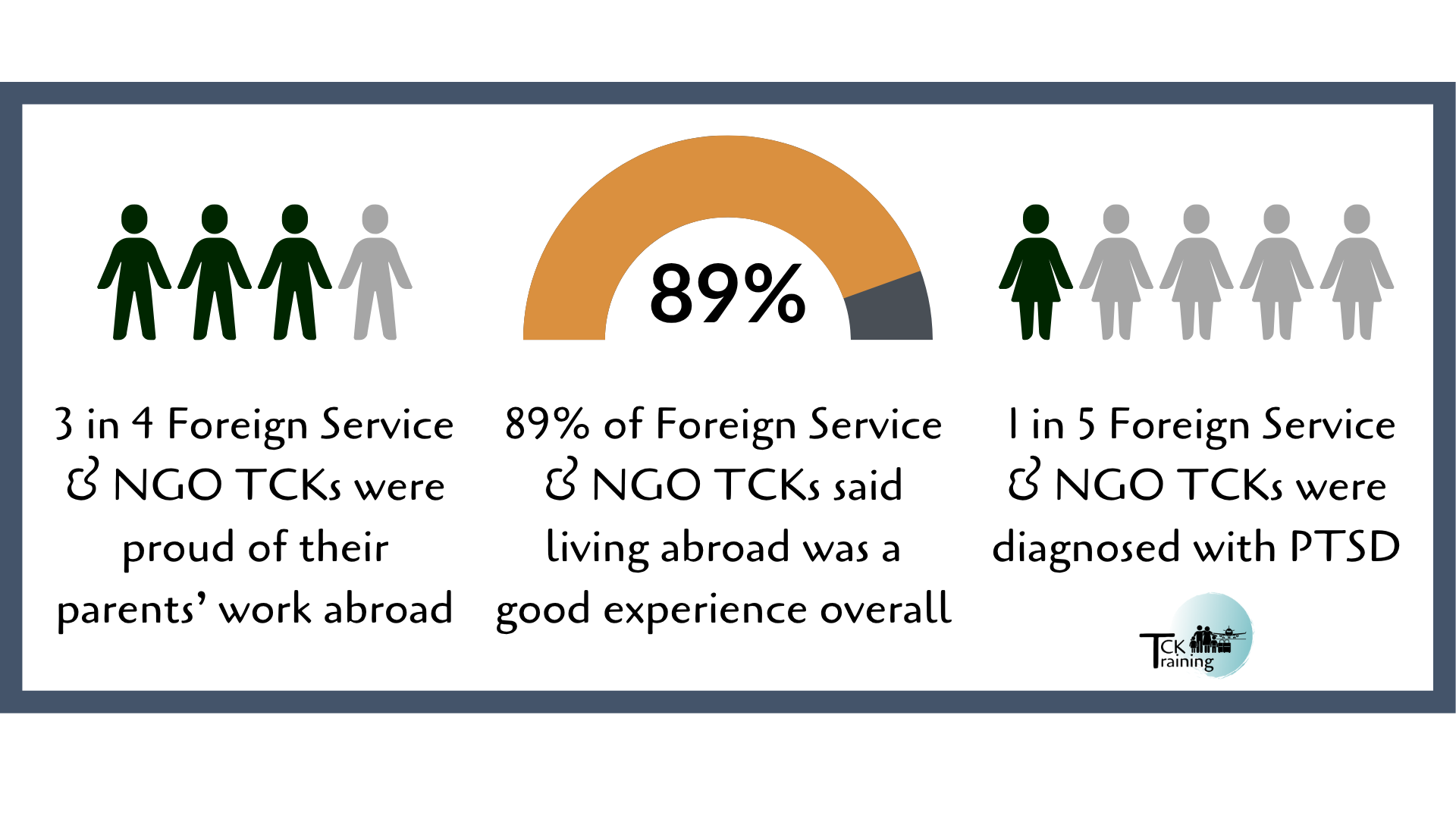
Individuals working in the diplomatic corps and foreign service sector, for any country, are by definition impacted by the vocational expectation of being a representative of an entire country at all times. This expectation is also placed upon their partners and children, especially during the experience of living outside their passport country.
Views of Childhood
Respondents were offered a list of statements and asked which reflected their own experiences of growing up as TCKs. These statements were based on common sentiments expressed during our work with hundreds of TCKs, including those we support with Unstacking Sessions. There were a lot of positive sentiments expressed, including:
25% of foreign service & humanitarian TCKs said their experience was “mostly painful” and 13% said it "ruined my life", which was a little higher than TCKs from other sectors. It is important to reiterate here that the majority of foreign service & humanitarian TCKs said they could see both good and hard parts in their story, and that living overseas was a good experience overall.
- 94% of foreign service & humanitarian TCKs could see both good and hard parts in their story.
- 89% of foreign service & humanitarian TCKs said living internationally as a child was a good experience overall.
- 66% of foreign service & humanitarian TCKs said this was “the best way to grow up”.
- 64% of foreign service & humanitarian TCKs said living abroad made their family closer.
25% of foreign service & humanitarian TCKs said their experience was “mostly painful” and 13% said it "ruined my life", which was a little higher than TCKs from other sectors. It is important to reiterate here that the majority of foreign service & humanitarian TCKs said they could see both good and hard parts in their story, and that living overseas was a good experience overall.
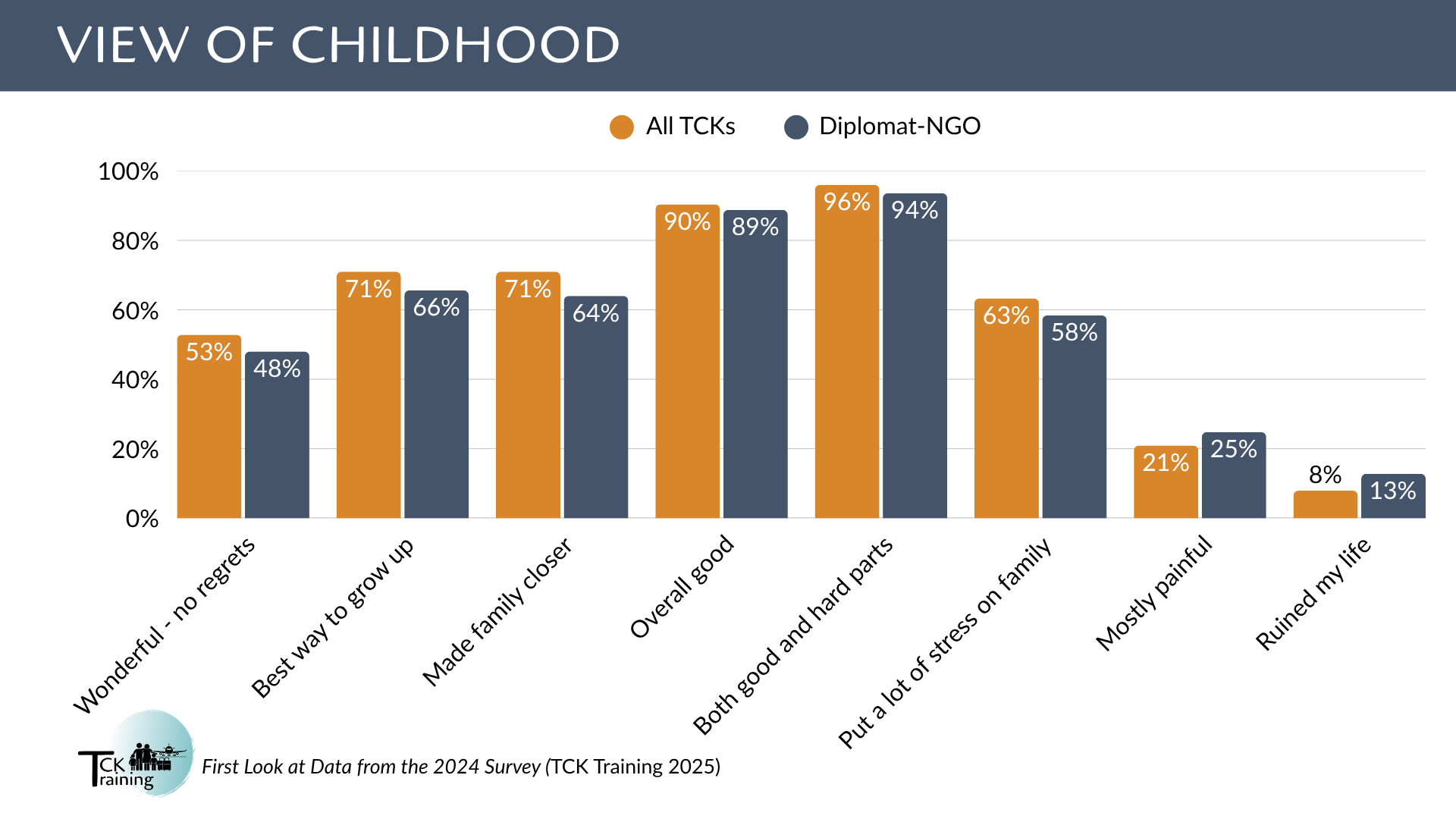
We also reviewed how parents’ occupation impacted TCKs by asking which statements they identified with as children.
The responses of foreign service & humanitarian TCKs demonstrated a deeper connection to their parents' work than most sectors. As children, 74% of foreign service & humanitarian were proud of their parents' work abroad, and 58% wanted to follow in their parents' footsteps. 55% felt a sense of purpose connected to their parents' work abroad.
Foreign service & humanitarian also experienced some pressures and anxieties as children connected to their parents' work - less than seen in missionary TCKs, but more than seen in other sectors. 44% of foreign service & humanitarian TCKs felt pressure to be 'perfect' while living abroad due to their parents' work, and 38% felt pressure to 'perform' while visiting their passport countries. 26% felt pressure to maintain their home language and accent.
The responses of foreign service & humanitarian TCKs demonstrated a deeper connection to their parents' work than most sectors. As children, 74% of foreign service & humanitarian were proud of their parents' work abroad, and 58% wanted to follow in their parents' footsteps. 55% felt a sense of purpose connected to their parents' work abroad.
Foreign service & humanitarian also experienced some pressures and anxieties as children connected to their parents' work - less than seen in missionary TCKs, but more than seen in other sectors. 44% of foreign service & humanitarian TCKs felt pressure to be 'perfect' while living abroad due to their parents' work, and 38% felt pressure to 'perform' while visiting their passport countries. 26% felt pressure to maintain their home language and accent.
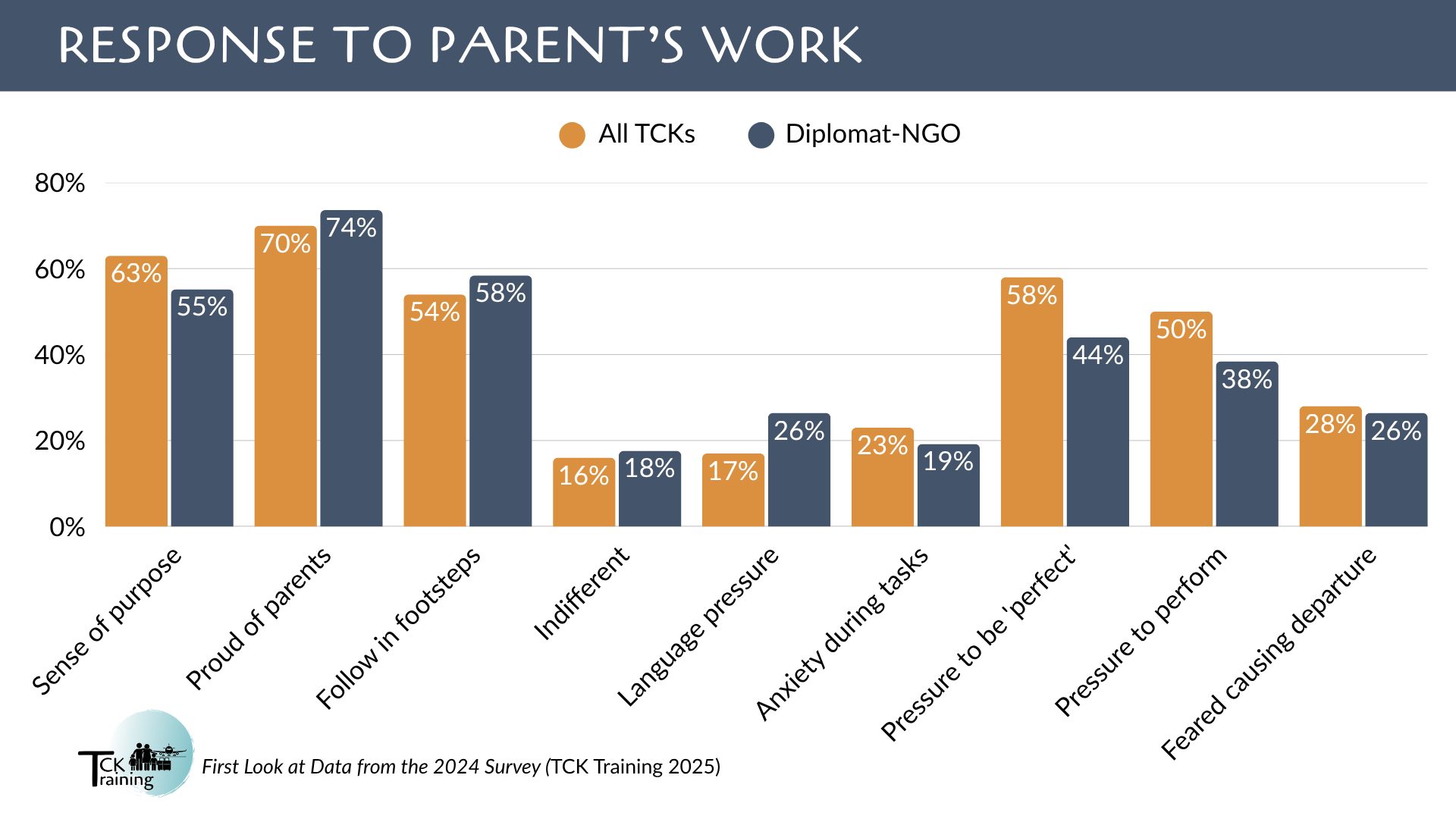
Strengths and Struggles in Adulthood
Drawing from our experiences working with hundreds of TCKs, we also curated lists of potential strengths and struggles that might be identified during adulthood. These were predominantly taken from things we regularly hear TCKs say when describing their experiences, but also included words and phrases that are often used to describe the TCKs life – for better or worse.
Strengths
Foreign service & humanitarian TCKs saw strengths in their adult selves more readily than other TCKs, such as the 94% who saw a Broad Worldview as one of their strengths. Other strengths identified included:
In addition, foreign service & humanitarian TCKs were more likely to identify Language Learning as a strength, compared to TCKs overall (54% vs 48%).
- 90% of foreign service & humanitarian TCKs identified Bridge Between Cultures as a strength
- 86% of foreign service & humanitarian TCKs identified Adaptability as a strength
- 84% of foreign service & humanitarianTCKs identified Hope in Compassion as a strength
- 84% of foreign service & humanitarianTCKs identified Open-Mindedness as a strength
In addition, foreign service & humanitarian TCKs were more likely to identify Language Learning as a strength, compared to TCKs overall (54% vs 48%).
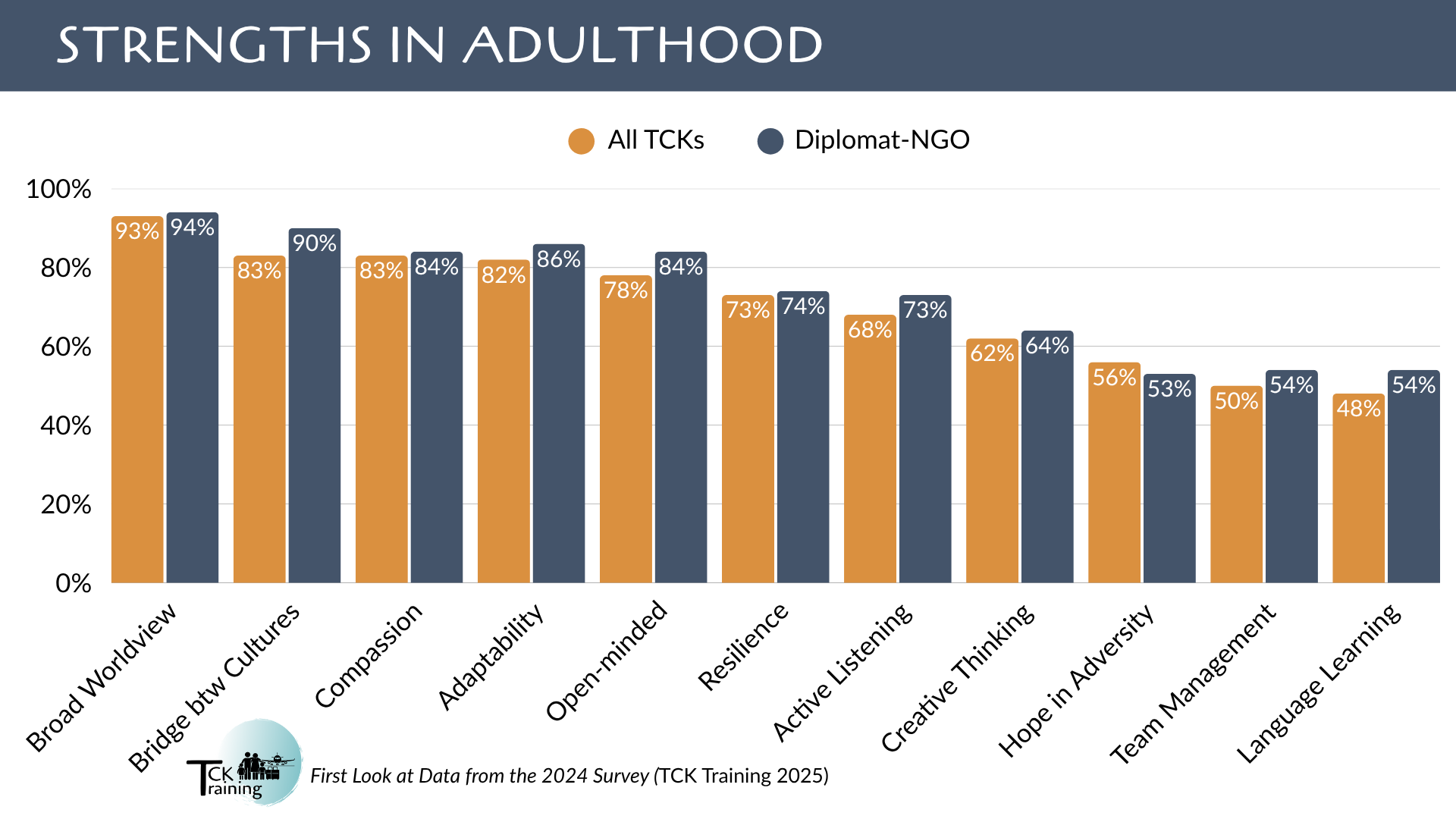
Struggles
Foreign service & humanitarian TCKs were generally a little more likely than other TCKs to identify with the listed adult struggles, with one notable exception. Foreign service & humanitarian TCKs were far less likely to say they struggled with unexpected sadness related to their childhood mobility (26% vs 42%), but also far more likely to say they struggled with unexpected anger (48% vs 21%.
Foreign service & humanitarian TCKs' greatest areas of struggle included:
- 78% of foreign service & humanitarian TCKs had trouble belonging
- 63% of foreign service & humanitarian TCKs experienced identity uncertainty
- 52% of foreign service & humanitarian TCKs experienced "itchy feet"
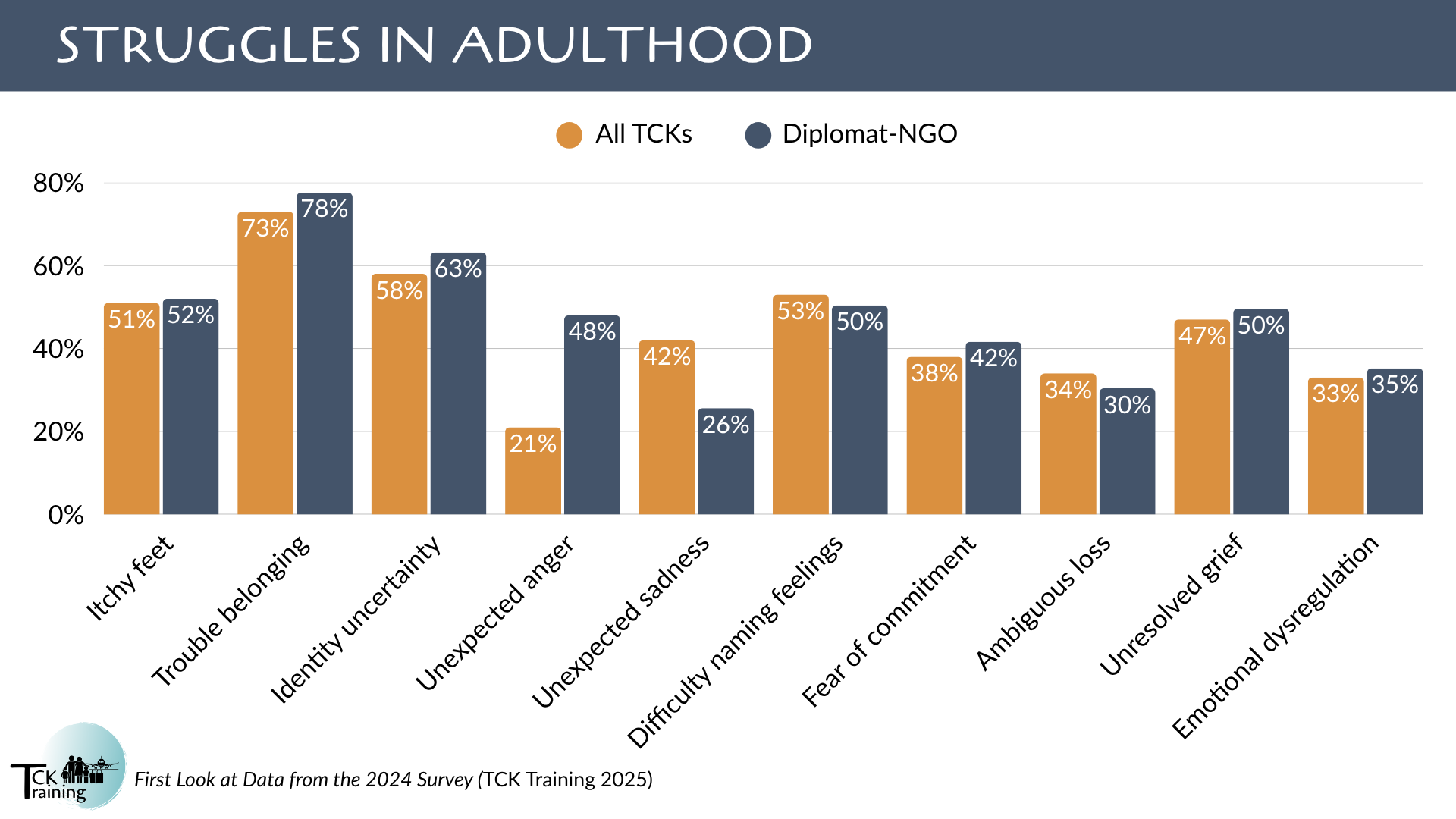
Mental Health
A range of questions were asked regarding experiences of mental health. This included discussions of childhood and adulthood experiences, what mental health care was available (and which was most helpful), screening questions developed in conjunction with several mental health professionals, and questions regarding formal medical diagnoses. We will begin here by looking at key symptoms of mental ill health reported by foreign service & humanitarian TCKs through screening questions.
Mental Health Concerns in Foreign Service & Humanitarian TCKs
34% of foreign service & humanitarian TCKs said they experienced a “serious mental health crisis” during childhood. Almost all foreign service & humanitarian TCKs surveyed had experienced symptoms of at least one mental health concern during their lifetime (93%), and nearly half (47%) had at least one formally diagnosed mental health condition.
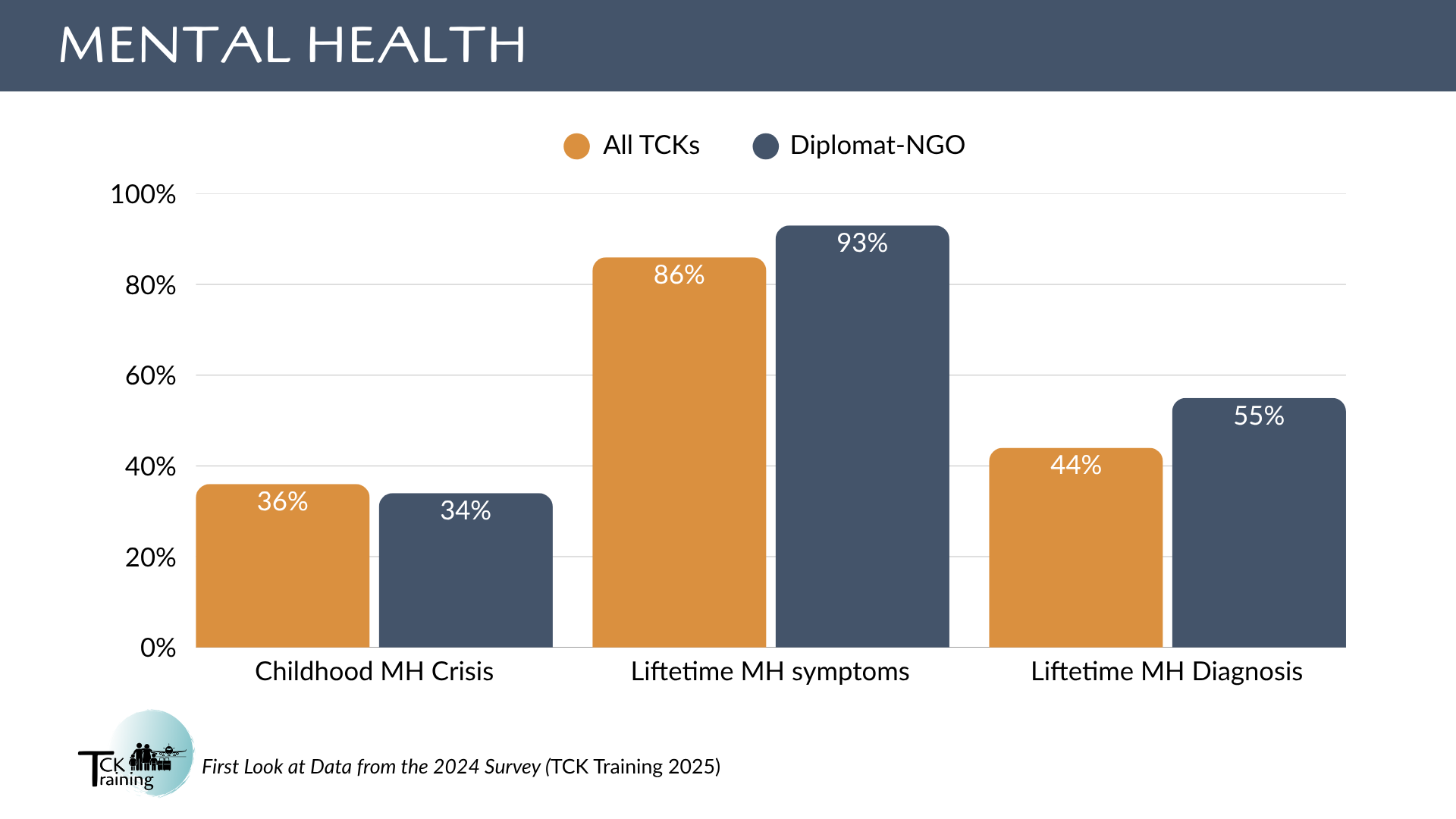
Symptoms of Mental Ill Health
Foreign service & humanitarian TCKs experienced symptoms consistent with each of the six mental health concerns discussed here at higher rates than TCKs in general.
- 68% of foreign service & humanitarian TCKs experienced symptoms of anxiety
- 61% of foreign service & humanitarian TCKs experienced symptoms of depression
- 48% of foreign service & humanitarian TCKs experienced symptoms of suicidal ideation
- 54% of foreign service & humanitarian TCKs experienced symptoms of PTSD
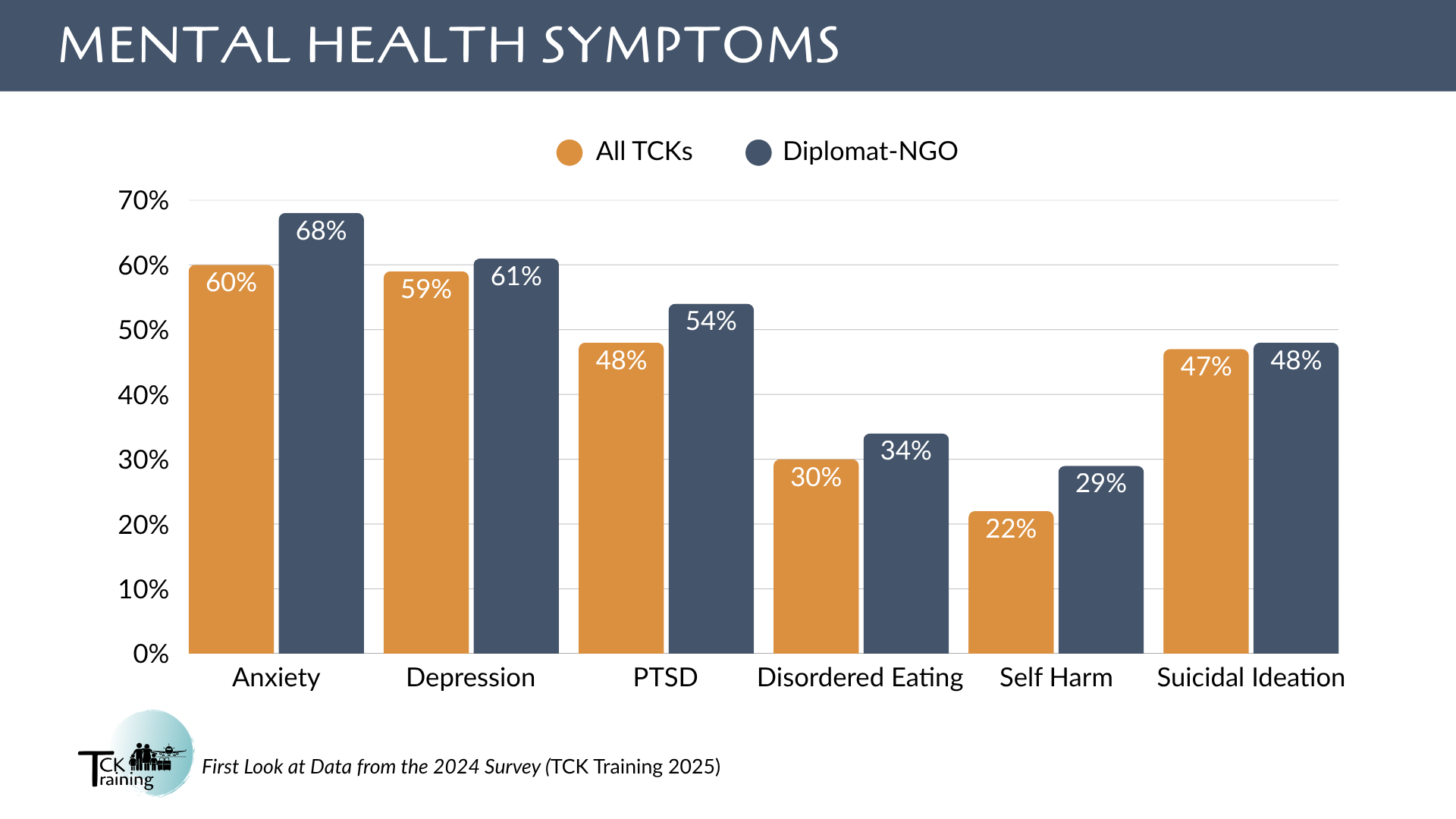
Diagnoses of Mental Health Conditions
Anxiety was the most commonly diagnosed condition among foreign service & humanitarian TCKs. 39% of all foreign service & humanitarian TCKs were diagnosed with anxiety, a third (33%) with depression, and 26% with panic attacks.
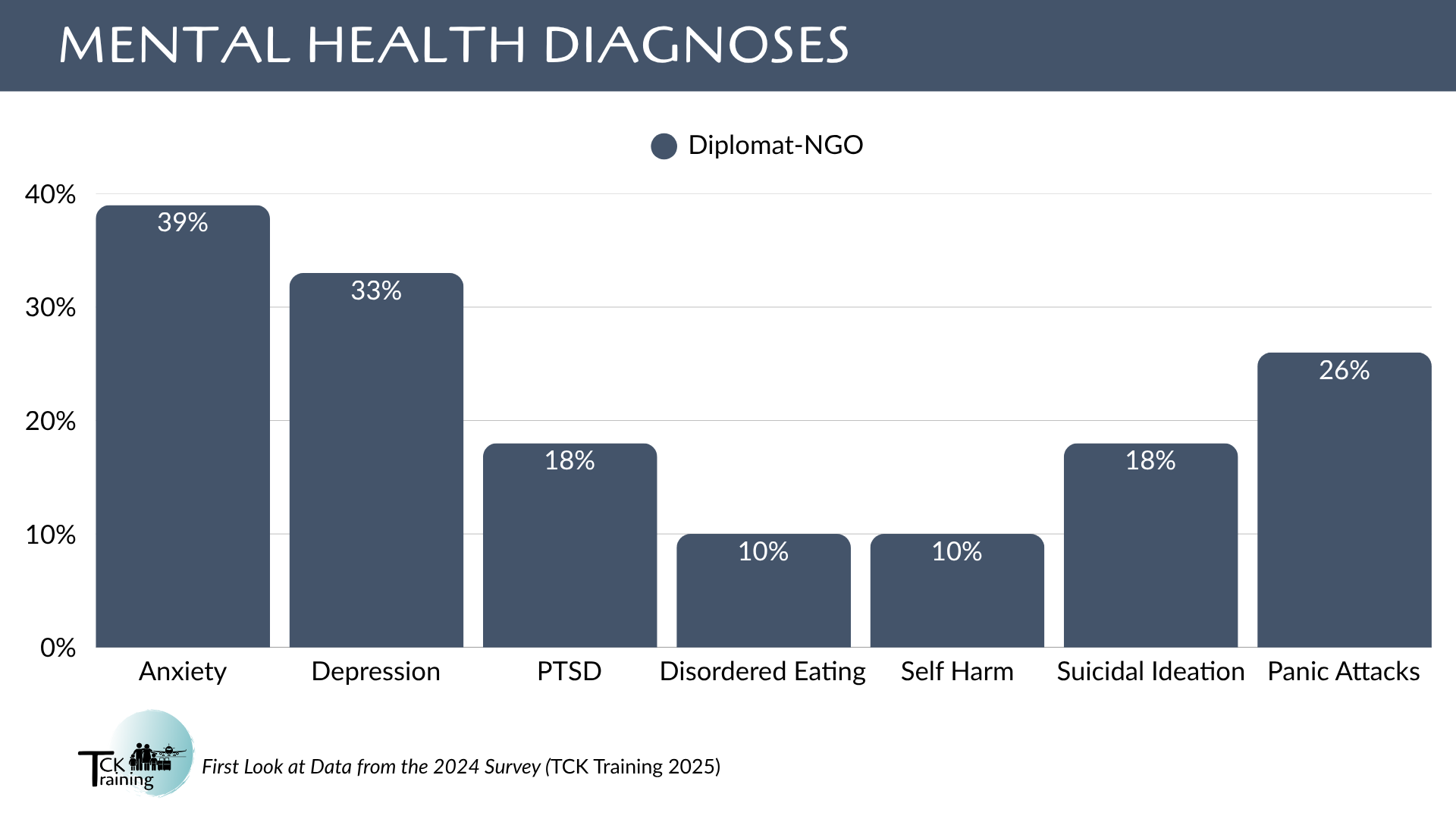
Previous research showed that a significant proportion of foreign service & humanitarian TCKs grew up in homes where adults struggled with their own mental health - with the pressure on these families increasing over time. It is important that corporate families living internationally receive support to improve the mental health of parents and children alike.
35% of diplomat kids reported household adult mental illness. Again, age made a difference. Only 25% of older diplomat kids reported household adult mental illness, compared to 42% of younger diplomat kids – a more than 1.5 times increase.
Implementing Effective Support
This data reveals a complex picture of foreign service & humanitarian TCKs’ globally mobile childhoods: both positive experiences of childhood overall, and difficult experiences with lasting impacts. Taking time to acknowledge this “ampersand life” – the both/and of the foreign service & humanitarian TCK experience – is important. As we do this, we ask the question: with this knowledge in hand, what can we do to provide empathetic and effective care to families who travel internationally for work?
The first step is simply acknowledging that the stress of international moves has a deep impact on families and the relationships between parents and children.
The first step is simply acknowledging that the stress of international moves has a deep impact on families and the relationships between parents and children.
Internationally mobile families and children are often viewed as privileged, and therefore not at risk of ACEs, PTSD, or other mental health struggles. This data suggests the opposite.
Having acknowledged this difficulty, we can start reaching out for resources that will support corporate families going through the additional stresses of international relocations. TCK Training is committed to providing tools and support systems that empower corporate TCKs and their families to thrive no matter where in the world they are.
Empty space, drag to resize
HR & Relocation Teams
For Parents of TCKs
For Adult TCKs
Related Blog Posts
For HR, Relocation Teams & Other Care Providers:
Those working in HR and relocation service to support these families can be trained to understand the specific issues they face beyond logistics and into the future. Additional supports can also be outsourced, and families can be provided with their own library of resources.
Departmental Support is essential for diplomats and their families. This may be provided through the HR department, and/or specific family support workers. Budgeting for this support is essential to ensuring foreign service families thrive long term. Community organizations are wonderful but cannot on their own bear the burden of providing for all families’ emotional needs.
When a school, higher education institution or humanitarian organization sends them abroad, that organization also bears responsibility for providing adequate information and effective support. Volunteer family organizations can be wonderful, but they also need institutional backing to provide the best care possible.
For Parents of TCKs
Parents can also build their own library of resources – both a literal library, and accessing online trainings that are designed for those raising children abroad. This workshop on Raising Thriving Kids Abroad is a place to great start!
TCK Training also offers a range of free resources to help families get started with tools to support their children through the stresses of international life.
TCK Training also offers a range of free resources to help families get started with tools to support their children through the stresses of international life.
Government employees working abroad, whether as diplomats or in any area of foreign service, deserve effective personal and family support to promote the long-term well-being of their children.
Families need education to understand not only the rewards but also the risks for international life...Protective factors such as Positive Childhood Experiences, healthy parent-child relationships and healthy parental mental health assist in mitigating the risk of Adverse Childhood Experiences taking their toll on diplomat children long term.
For Adult Corporate TCKs
Living abroad as a kid comes with unique joys and struggles – and that’s okay! Acknowledging the both/and of this life helps us.
As a TCK you can receive support directly – no matter how old you are, and how long ago you lived abroad. There are a range of Unstacking resources to help you process your experiences and how they’ve shaped you. There is the Unstacking book, coaching sessions, and a self-guided course. Learn more about these and other resources here!
As a TCK you can receive support directly – no matter how old you are, and how long ago you lived abroad. There are a range of Unstacking resources to help you process your experiences and how they’ve shaped you. There is the Unstacking book, coaching sessions, and a self-guided course. Learn more about these and other resources here!
Whether in direct conversations about diplomatic events or just responses from my environment, the messaging around me reinforced that my thoughts and emotions didn’t matter, as long as I was perfect...There were also a lot of good things I learned from being a diplomat kid. I got to see things from a global lens and easily navigate between cultures. It helped me empathize with so many different kinds of people around the world.
What's it like being a diplomat kid?
Related Blog Posts
Other Research Articles
- Caution and Hope for Diplomat Families
- Mitigating Risk Factors for Diplomat Kids
- When Diplomat Families Witness or Experience Traumatic Events
- Caution and Hope for Children of International Educators and Humanitarian Workers
- Mitigating Risk Factors for Children of International Educators and Humanitarian Workers
- When Education and Humanitarian Families Witness or Experience Traumatic Events
About the Author
Tanya Crossman grew up in Australia and the US before moving to China at age 21; she has worked with TCKs for 20 years. She is the Director of Research and International Education at TCK Training.



